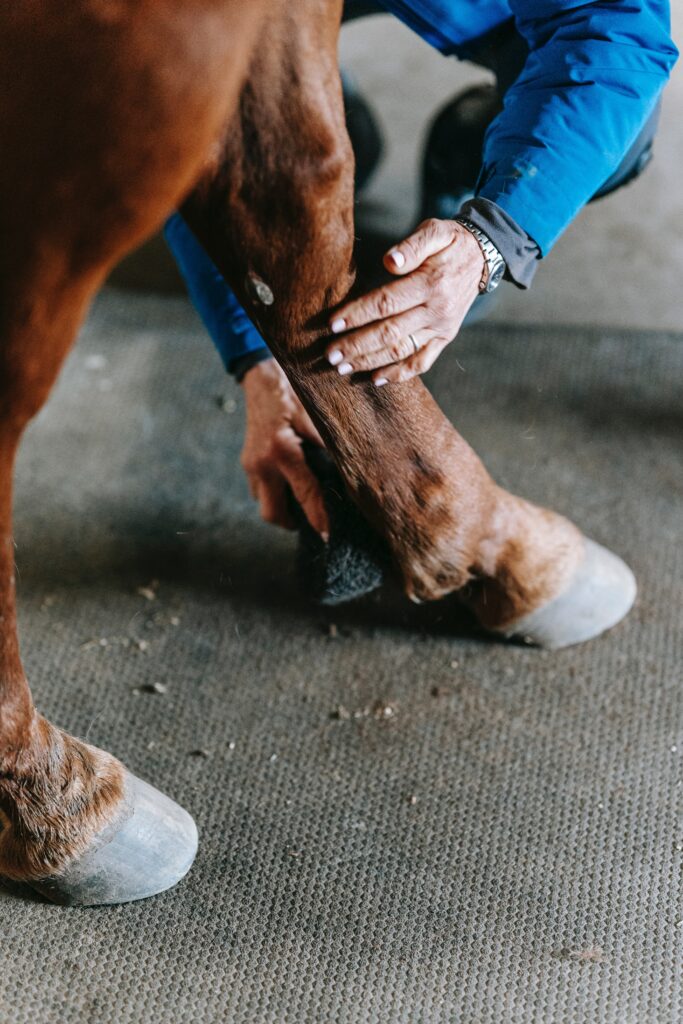Taking care of the hooves
Observation and daily care of the hooves are crucial for the health of your horse. If you suggest that your four-legged friend may have serious health problems due to the condition of the hooves, reach out for your veterinarian immediately. Have a look at the following list of tips how to perform your daily routine when it comes to the hooves and frogs.
.
1. Keep the bedding dry and clean.
Dirty, wet bedding is the ideal environment for bacteria and fungi to build up within the feet, which can lead to various bacterial infections such as thrush. To remove unwanted viruses, fungi and bacteria, use the Sanocyn forte Solution and Hydrogel. The Solution effectively removes unwanted fungi, bacteria and viruses, while the hydrogel forms a protective film, which can prevent new and secondary infections. Both products are alcohol-free and pH neutral. Thus, they do not sting and burn. They are based on hypochlorous acid (HOCl), which is very well tolerated by pets and suitable for daily use. To know more about thrush read our article about it.
2. Daily pick out the hooves
It is of paramount importance to pick out the hooves at least once a day. It allows oxygen to penetrate the underside of the hoof, reducing the risk of bacterial and fungal infections. Moreover, the daily check of the hooves is crucial to identify any cuts, wounds, damage and infections. If you observe something unusual, reach out for help at your vet clinic. Additionally, if your horse has gotten into mud, remove it from the underside of the hoof.
3. Quality of nutrition matters
Feed your horse good quality hay, as the nutrition may prevent some hoof problems. Moreover, your four-legged friend should always have access to fresh and clean water. Furthermore, contact your veterinarian or horse nutritionist to develop a good nutrition plan which includes vitamins and minerals. Research shows hooves can benefit from hoof care products that contain biotin, iodine and zinc.

share our post:

Papillomas in horses
Papillomas, also known as warts, are a common viral skin disease in horses. They are caused by the equine papillomavirus (EPV), which is highly contagious and can be transmitted between horses through direct contact or contaminated equipment. While papillomas are not usually a serious health concern, they can be unsightly and can cause discomfort or irritation for the horse.

Cats and heat
Cats are known for their love of warmth and sunshine, but when temperatures soar, our feline friends can face some challenges. As a cat owner, it’s important to understand how cats cope with heat and what you can do to help them stay cool and comfortable during hot weather.

Summer travel with your dog
Summer is a great time to hit the road with your furry friend and explore new destinations together. However, traveling with a dog requires some extra planning and preparation to ensure a safe and enjoyable trip for both you and your four-legged companion. In this article, we will provide some helpful tips and advice for traveling with a dog during the summer.

Sunburn in horses
Sunburn is a common issue that can affect horses during the summer months, especially those with light-colored hair or pink skin. In this article, we’ll discuss what causes sunburn in horses and how you can prevent and treat it.

Itchy skin on your pet?
One of the most occurring reasons to visit a vet is itchy skin. It is an urgent problem that causes discomfort for the pet as well as for its owner. If you identify itchy skin in your pet, you should make an appointment with your veterinarian. Let’s discuss what you should expect from your appointment.
